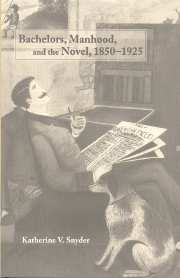Book contents
- Frontmatter
- Contents
- Acknowledgments
- Abbreviations
- Introduction
- Chapter 1 Trouble in paradise: bachelors and bourgeois domesticity
- Chapter 2 Susceptibility and the single man: the constitution of the bachelor invalid
- Chapter 3 An artist and a bachelor: Henry James, mastery, and the life of art
- Chapter 4 A way of looking on: bachelor narration in Joseph Conrad's Under Western Eyes
- Chapter 5 The necessary melancholy of bachelors: melancholy, manhood, and modernist narrative
- Afterword
- Notes
- Bibliography
- Index
Chapter 4 - A way of looking on: bachelor narration in Joseph Conrad's Under Western Eyes
Published online by Cambridge University Press: 22 September 2009
- Frontmatter
- Contents
- Acknowledgments
- Abbreviations
- Introduction
- Chapter 1 Trouble in paradise: bachelors and bourgeois domesticity
- Chapter 2 Susceptibility and the single man: the constitution of the bachelor invalid
- Chapter 3 An artist and a bachelor: Henry James, mastery, and the life of art
- Chapter 4 A way of looking on: bachelor narration in Joseph Conrad's Under Western Eyes
- Chapter 5 The necessary melancholy of bachelors: melancholy, manhood, and modernist narrative
- Afterword
- Notes
- Bibliography
- Index
Summary
Joseph Conrad acknowledged a change in focus when he changed the title of his 1911 novel-in-progress from “Razumov” to Under Western Eyes. The title change reflects Conrad's recognition that the focus of his novel had shifted from its Russian protagonist, the student Razumov, to the point of view of the English bachelor and language-teacher who narrates the story. The story, as told by Conrad's narrator, ultimately focuses less on Razumov than on the female object of his desire, the Russian expatriate, Natalia Haldin. This bachelor narrator can't keep his Western eyes off her.
The focus of the narrator's eyes on the novel's heroine reflects Conrad's attempt to write something recognizably along the lines of the English novel of sensibility, a tradition of the novel marked not only by its national affiliation but also by its courtship and marriage plotting. Under Western Eyes was Conrad's first serious attempt to capture that segment of the English reading public for whom his earlier sea-faring novels had little appeal: women readers. By centrally featuring a female character and by addressing parts of this novel to the Woman Question, Conrad was responding to the popularity of “women's fiction” — fiction written by and for women — as well as to the gender politics at issue in the popular New Woman novels of the fin de siècle.
- Type
- Chapter
- Information
- Bachelors, Manhood, and the Novel, 1850–1925 , pp. 141 - 171Publisher: Cambridge University PressPrint publication year: 1999

